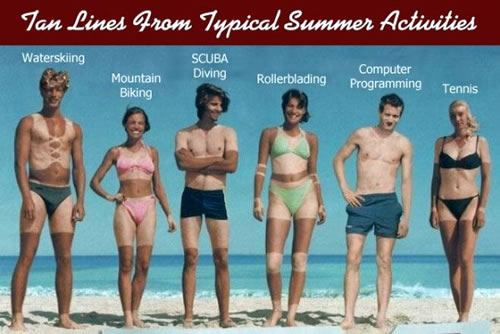How to Survive Being a Globo-Gym Trainer
Ahhhhhhhhhhh, it’s so nice to have warm weather out there finally!! After a long and bitterly cold winter, we finally have some above-average temperatures and I can show off my pasty white legs in some shorts, bike into work, and enjoy long romantic river valley walks with the Future and the pooch. The only downside is that my bike tire is being a stupid bitch and keeps flatting on me, mosquitoes are starting to work out and are almost as big as the neighbors cat, but YAY IT’S SUMMER!!!
Many people out there might be shocked to find out that I work at a big-box Globo-Gym known as World Health, especially with everyone and their dog across the internet saying that working at such establishments would prove to be more of a soul-crushing and pocket draining experience than dating a Kardashian. While I will admit that there are a few disadvantages to working at an organization that makes all the rules and expects you to play along by them (music that doesn’t change. Ever. And Sucks. Always. Uniforms.) , there are a few advantages that I’ve been able to work in my favor, and some perks along the way.
While I’m not going to write this to persuade any studio owner or self-employed trainers to give up their practice and run to their nearest health club, I wanted to show a few reasons why I prefer to work at a club setting rather than on my own.
Background Time!!!
I come from a family of trade workers. My dad’s a carpenter (recently retired), and both of my brothers are mechanics, one is a grand-master automotive technician and the other a heavy-duty mechanic. Most of my uncles are welders or mechanics as well, so I know a few things about what it takes to become a fully licensed trade worker.
To become licensed as, say, a plumber, you have to attend a trade school for up to 2 years to learn the basics. Then you get to go out and look for work as an apprentice under a supervisor, essentially making a hair over minimum wage as you do it. On top of this, you will have to buy your own tools, insurance, travel expenses, and all the other fun things that come along with it, as well as constantly kiss the ass of your employer so they will sign off on your hours and not leave you hanging. Think dumbells are expensive? Try shelling out a grand for one tool, and then buy another 20 to 30 thousand worth of tools, just to get started. Then if something breaks, you ave to get another one, on your dime.
Apprenticeships tend to last for about 4 years, and have graduated pay scales as you go. The rate that they charge out to a customer or client will definitely not be the amount they get paid. So in other words, you won’t start making any real coin until you’ve invested about 6 years into your profession, and even then it’s all determined by the work you do and how busy you can make yourself, as well as any advanced seals or certifications you can get your hands on. Sound familiar??
Conversely with personal training, a trainer can set up shop and start charging suckers willing clients after taking a 30 hour course (or paying for an internet exam, but I’ll save that piece for another time), having no practical shadowing whatsoever. Sounds fair, doesn’t it? Even though there’s a minimum required investment of time and effort, some trainers tend to feel that they should be making rock-star dough right out the gate, having never trained anyone or taken any formal education to figure out whether what they’re doing is effective or just simply stupid enough to make me want to claw at my face with a garden rake to make it stop.
OMG!!! You mean Jillian doesn’t have much edumucashoun or mad trainer skillz?? Whah????? Whuuhhhhh???
Hard Facts About Health Clubs
After working in a health club for a number of years, as well as working closely with a lot of the senior management, I’ve come to learn a few things about how they are run and some of the hidden costs associated with them. If you figure that I work in a 35,000 square foot executive playground in a downtown metropolitan area, lease space alone will be through the roof. Add in other fun features like utilities, essential staff (reception, housekeeping, maintenance), music licensing, marketing, equipment costs, and other fun features, the memberships being sold essentially cover the costs of keeping me in a happy little playground with no expenses to myself.
To put it in perspective, I’ve met a few (dozen) trainers that hated the health club life, decided to set up their own studio, only to come to realize that now instead of just showing up and training, they have some additional responsibilities each day. They have to also clean the bathrooms or hire someone to do it, handle all the billing or hire someone to do it, pay rent and utilities regardless of how much money is coming in, hire a trainer to off-set costs and then hopefully have a trainer that has their own clients and doesn’t need to be trained themselves, and once all that is done, they can finally start training their clients. Freedom never tasted so good, did it??
A lot of trainers like to gripe about the fact that the health club will take a big percentage of their session rate. Now no matter who you are as a trainer, you have to realise that you will not ever make 100% of the rate that you charge for a training session, ever. Keeping in mind that most studio trainers have to make monthly rent payments to their studio and studio owners have overhead to cover each month, a lot of new trainers will still find a way to piss and moan about the fact that the health club takes such a big percentage of their session, even though they only train 10 sessions a week and didn’t have to sell any of those clients themselves or source them in on their own. A new trainer with no experience and no formal education can expect to make roughly 35-45% of their session rate, which in all honesty is pretty good considering they haven’t proven themselves as of yet, haven’t built any value as a trainer, and have a low relative worth in the companies eyes.
Now a more experienced trainer can expect to make about 2/3 of their session cost directly, but are also in line for a few additional perks, such as sales commissions, vacation pay, health benefits, bonuses, and other fun things like that depending on the organization they work for and how well they do. A trainer who’s working hard can realistically tally close to 75% of their sales as income, either directly from each session or indirectly from sessions, sales bonuses and other goodies. As an example, I’ve gone to Cancun three times (qualified for four) for a week in an all-inclusive resort, traveled to national and international conferences, and made enough in sales bonuses to help pay for our up-coming wedding over the past few years, all on the company dime. Pretty sweet, right??
Also, if you’re a good trainer, and you show how you are adding value to the organization and that you can help expand the value further than currently available, you can work your way into a pretty nice gig with some cool benefits beyond the financial. For instance, I organized and designed a role for myself as the medical and rehabilitation coordinator a few years ago, which let me develop a company-wide medical referral network to get doctors, chiropractors and physiotherapists to send us clients for post-rehab training, which garnered a corner office (a back corner, but whatever), the ability to teach courses to help sharpen my presenting skills for any conferences I apply for, and a voice that senior management listens to with regard to any upcoming changes that may affect how the training department develops.
THIS DID NOT HAPPEN WITHIN THE FIRST YEAR!! It took time, and consistently proving myself to actually show that I know what I’m talking about.
Also, I teach the certification course to get new trainers up and running (canfitpro up here in Canada), which I can run out of my club for free. If I didn’t work here, I would have to coordinate dates and times with a third-party source, pay an agency fee to use the space (out of my pocket), market everything myself, and hope the course will fill up on time and that there won’t be any conflicts with forgotten or mismanaged bookings or potential double-bookings with other organizations. Since World Health needs their trainers to be certified, every new applicant who isn’t currently certified is sent to my courses, which fills them up faster, and there’s no agency fee. Win-win for me!!
Some additional benefits that a health club could offer, depending on the organization, can include fun things like:
health coverage
scholarships for conferences
continuing education departments, or partial payment of advanced certifications
professional marketing designs
easy to acquire new clients
no accounting costs
While I would definitely encourage any trainer to follow their passions and work in a system that works the best for them, some just aren’t cut out to be great trainers in a health club, and some health clubs aren’t cut out to have great trainers working for them. However, there are exceptions to both sides. I’m fortunate enough to work in a company that actually pays attention to its’ top earners and is willing to re-invest in their employees as long as they see a value coming back from it.
So if you work in a health club and you feel you’re not getting the respect you deserve, ask yourself a few key questions:
1. What kind of value does your presence bring to the company? In other words, how much money doe you make the company to make them want to keep you around? This can be measured in direct sales, retention, member experience, and team environment
2. Do you do the minimum, or do you treat your gym like your house? Cleaning, organizing, trying to find ways to improve, and helping build a sense of community in your facility make it feel more like you want to be there versus feeling like you HAVE to be there.
3. Do you bring business to the club, or do you try to get the club to give you business all the time? When was the last time you had a referral come in specifically to see you?
4. How much do you work in a given week? Session totals tell the tale, so if you’re only training 30 sessions a month, you’re not going to be viewed with the same eye as someone training 200 sessions a month, even if yours are the absolute most perfect and groundbreakingly advanced workouts ever generated by mankind and you look like you just stepped off the cover of MuscleMag.
So if you can honestly answer these questions and show that you actually aren’t simply a chair moistener looking for a hand-out for simply occupying space, you can survive in pretty much any space you decide to work in. Definitely, health clubs aren’t for everyone, but for me they seem to work. The rhetoric around the net saying that only brain-dead trainers work there may be true for the most part, but I can tell you the difference between my ass and my acetabulum, and as a counter-point, I’ve met a lot of trainers who’ve set up their own shop and still trained biceps on Tuesdays with every client. Where you work doesn’t define who you are, but your actions in your situations define you.




3 Responses to How to Survive Being a Globo-Gym Trainer